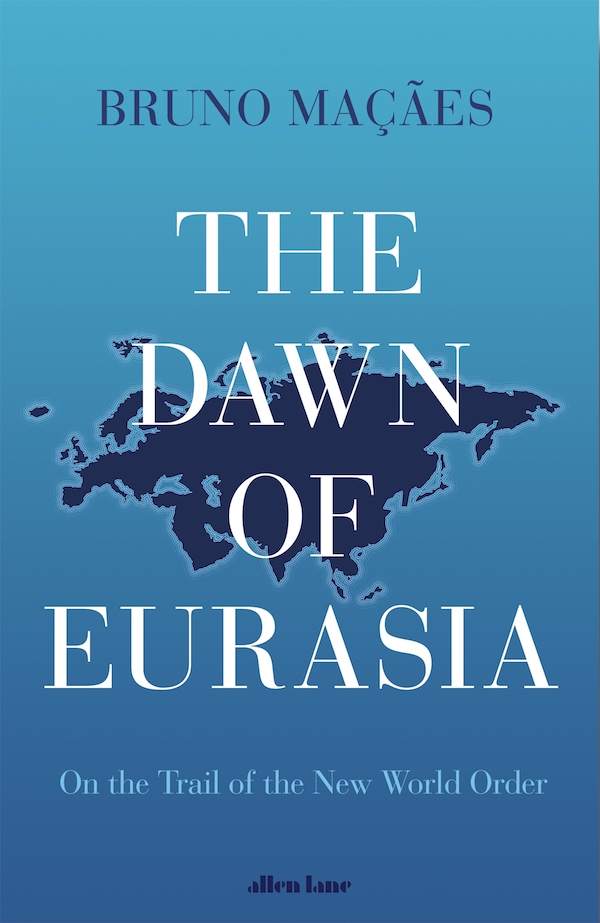Bruno Maçães: The Dawn of Eurasia review - middle of nowhere | reviews, news & interviews
Bruno Maçães: The Dawn of Eurasia review - middle of nowhere
Bruno Maçães: The Dawn of Eurasia review - middle of nowhere
Tediously written tract from the centre right makes some mildly interesting points

Part travelogue and part broad analysis of the current and future challenges facing the EU, the premise of Bruno Maçães’s new book The Dawn of Eurasia is to “use travel to provide an injection of reality of political, economic and historical analyses.”
The central plank of Maçães’s argument is that China and Russia will in the near future be recognised as playing pivotal roles in the way “people, goods, energy, money and knowledge” flow. These flows cross a space he terms “Eurasia” characterised less as a geographic entity than a conceptual space governed by political, economic, and to a far lesser extent, cultural concerns — the abstract site of another great game. Relations between actors (states, unions of countries, economic pacts) within this space are distinguished by “incessant competition between different ideas of how worldwide networks should be organised” and “interdependency”, meaning that “this system is open to change, [and] its rules may be influenced or determined by the choices and actions of the different participants and, as a result, tilted more in favour of some rather than others.” Hack through the blank words, and he seems to be describing globalised capitalism.
Prolixity aside, Asian states are already quite clearly making their economic and political presence felt. The Shanghai Cooperation Organisation is a case in point — it’s not so much that a wholly new system is emerging (as Maçães posits) so much as a fundamental change in the status quo is taking place. Maçães calculates the global economy’s centre of gravity (“the average location of economic activity measured on a globe”) as having shifted from the mid-Atlantic in the 50s, 60s and 70s, to the eastern edge of the EU by the millennium and predicts it will be somewhere between China and India by 2050. Of course many things contributed to this shift historically, and this doesn’t so much devalue his contentions concerning the current and possible future state of the global economy as draw attention to his ardent determinism, devotion to jargon, and over-reliance on some pretty dubious presumptions: “In Europe, where history and progress have been marching ahead for half a millennium, the lines between present and past are, if anything, too neat and precise. In Asia, which until recently lived outside all historical movement, the idea of the past is so new that, paradoxically, it is only now starting to be built and belongs mostly to the future,” — pardon? Or “for the first time in modern history, [Asian countries] are on the same level of historical development while showing no sign of converging with European values.” It’s the fact that Asian states’ priorities and actions are diffuse and do not mimic European ones that Maçães appears to find the greatest challenge.
 For all his claims to be looking to the future, Maçães’s conception of the role Europe will be able to play remains by and large characterised by its current position. The inflexibility leads to some odd arguments. According to Maçães, if Europe is to retain sway in the future’s geopolitics, it needs to take on a more forceful political stance. To this end the March 2016 EU-Turkey Refugee Deal becomes his keystone example of successfully muscular negotiations. He freely admits it as “a betrayal of European values,” but also paints it as a turning point in Europe’s relationship to “the larger unruly world on its doorstep.” He omits to mention how the deal leaves the EU hostage to Turkey, refrains from touching on why so many people are fleeing their home countries, and ducks the question of what is being defended if European values have been hollowed out. For all his acknowledgment of the squalor and tragedy of the situation, to him these people remain trapped in the economic paradigm — they are only numbers.
For all his claims to be looking to the future, Maçães’s conception of the role Europe will be able to play remains by and large characterised by its current position. The inflexibility leads to some odd arguments. According to Maçães, if Europe is to retain sway in the future’s geopolitics, it needs to take on a more forceful political stance. To this end the March 2016 EU-Turkey Refugee Deal becomes his keystone example of successfully muscular negotiations. He freely admits it as “a betrayal of European values,” but also paints it as a turning point in Europe’s relationship to “the larger unruly world on its doorstep.” He omits to mention how the deal leaves the EU hostage to Turkey, refrains from touching on why so many people are fleeing their home countries, and ducks the question of what is being defended if European values have been hollowed out. For all his acknowledgment of the squalor and tragedy of the situation, to him these people remain trapped in the economic paradigm — they are only numbers.
He also complains that Chinese companies are, to all intents, the Chinese state as they respond to state funding which is driven by government policy. “It is not enough for the European Union to uphold its rules and way of life,” he lectures officials from the German Foreign Ministry, “It needs to create a wider environment where they can work effectively.” Chinese public-private interaction is more fractured by far but his subtext is almost a lament that the EU is not set up to exert similarly stringent pressure on its own native businesses. Likewise, his main disappointment in Ukraine not signing the association agreement at Vilnius appears to be that the EU lost the opportunity of having a backyard. Fair enough, but it’s a pretty unsubtle argument which once again ignores the policy implications of life-as-lived.
The Dawn of Eurasia is unashamedly centre right — and that’s all well and good — but its flabby writing could be condensed down to a few dense policy pages. Maçães is well read but he’s also a pedant. And if after a long stay in Baku it is still possible to write: “Lost between so many warring empires, Azerbaijanis have long ago learned not to aspire to a linear, progressive history,” it’s worth asking what kind of reality he considers his travels injected into his analyses.
- The Dawn of Eurasia: On the Trail of a New World Order by Bruno Maçães (Allen Lane, £20)
- read more book reviews on theartsdesk
Add comment
The future of Arts Journalism
You can stop theartsdesk.com closing!
We urgently need financing to survive. Our fundraising drive has thus far raised £49,000 but we need to reach £100,000 or we will be forced to close. Please contribute here: https://gofund.me/c3f6033d
And if you can forward this information to anyone who might assist, we’d be grateful.

Subscribe to theartsdesk.com
Thank you for continuing to read our work on theartsdesk.com. For unlimited access to every article in its entirety, including our archive of more than 15,000 pieces, we're asking for £5 per month or £40 per year. We feel it's a very good deal, and hope you do too.
To take a subscription now simply click here.
And if you're looking for that extra gift for a friend or family member, why not treat them to a theartsdesk.com gift subscription?
more Books
 'We are bowled over!' Thank you for your messages of love and support
Much-appreciated words of commendation from readers and the cultural community
'We are bowled over!' Thank you for your messages of love and support
Much-appreciated words of commendation from readers and the cultural community
 Natalia Ginzburg: The City and the House review - a dying art
Dick Davis renders this analogue love-letter in polyphonic English
Natalia Ginzburg: The City and the House review - a dying art
Dick Davis renders this analogue love-letter in polyphonic English
 Tom Raworth: Cancer review - truthfulness
A 'lost' book reconfirms Raworth’s legacy as one of the great lyric poets
Tom Raworth: Cancer review - truthfulness
A 'lost' book reconfirms Raworth’s legacy as one of the great lyric poets
 Ian Leslie: John and Paul - A Love Story in Songs review - help!
Ian Leslie loses himself in amateur psychology, and fatally misreads The Beatles
Ian Leslie: John and Paul - A Love Story in Songs review - help!
Ian Leslie loses himself in amateur psychology, and fatally misreads The Beatles
 Samuel Arbesman: The Magic of Code review - the spark ages
A wide-eyed take on our digital world can’t quite dispel the dangers
Samuel Arbesman: The Magic of Code review - the spark ages
A wide-eyed take on our digital world can’t quite dispel the dangers
 Zsuzsanna Gahse: Mountainish review - seeking refuge
Notes on danger and dialogue in the shadow of the Swiss Alps
Zsuzsanna Gahse: Mountainish review - seeking refuge
Notes on danger and dialogue in the shadow of the Swiss Alps
 Patrick McGilligan: Woody Allen - A Travesty of a Mockery of a Sham review - New York stories
Fair-minded Woody Allen biography covers all bases
Patrick McGilligan: Woody Allen - A Travesty of a Mockery of a Sham review - New York stories
Fair-minded Woody Allen biography covers all bases
 Howard Amos: Russia Starts Here review - East meets West, via the Pskov region
A journalist looks beyond borders in this searching account of the Russian mind
Howard Amos: Russia Starts Here review - East meets West, via the Pskov region
A journalist looks beyond borders in this searching account of the Russian mind
 Henry Gee: The Decline and Fall of the Human Empire - Why Our Species is on the Edge of Extinction review - survival instincts
A science writer looks to the stars for a way to dodge our impending doom
Henry Gee: The Decline and Fall of the Human Empire - Why Our Species is on the Edge of Extinction review - survival instincts
A science writer looks to the stars for a way to dodge our impending doom
 Jonathan Buckley: One Boat review - a shore thing
Buckley’s 13th novel is a powerful reflection on intimacy and grief
Jonathan Buckley: One Boat review - a shore thing
Buckley’s 13th novel is a powerful reflection on intimacy and grief
 Help to give theartsdesk a future!
Support our GoFundMe appeal
Help to give theartsdesk a future!
Support our GoFundMe appeal
 Jessica Duchen: Myra Hess - National Treasure review - well-told life of a pioneering musician
Biography of the groundbreaking British pianist who was a hero of the Blitz
Jessica Duchen: Myra Hess - National Treasure review - well-told life of a pioneering musician
Biography of the groundbreaking British pianist who was a hero of the Blitz

Comments
Not sure you geopolitical